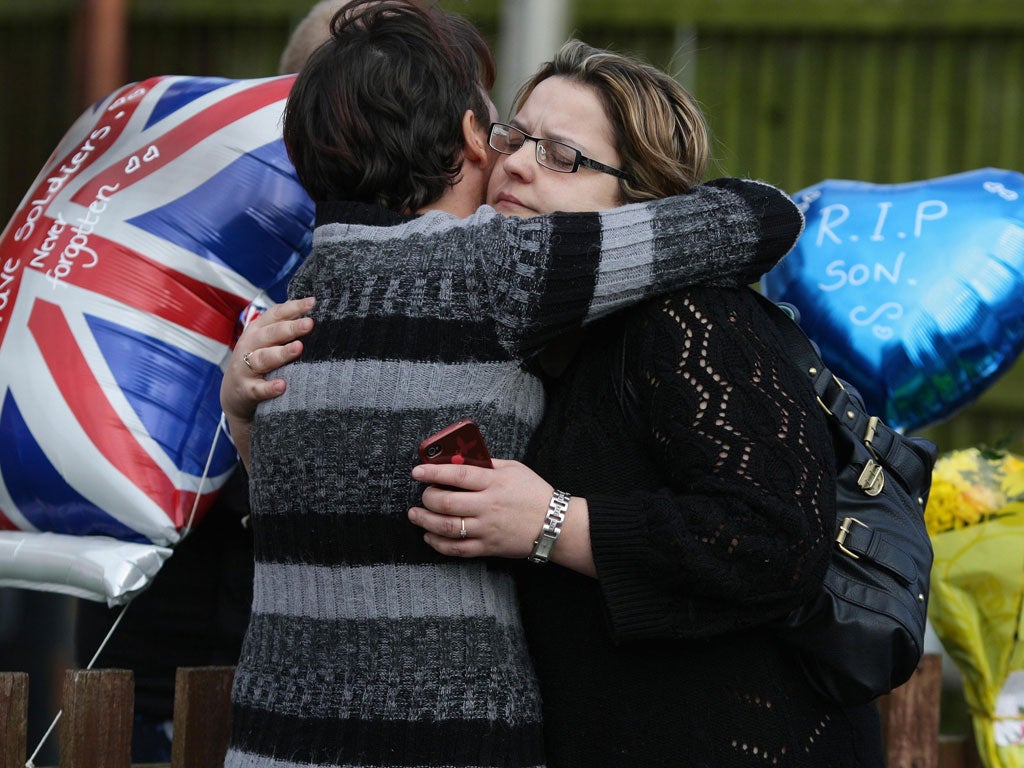Troops stunned but determined to 'crack on' with job
Battalion waiting to go out to Afghanistan undaunted by deaths, say commanders

Your support helps us to tell the story
From reproductive rights to climate change to Big Tech, The Independent is on the ground when the story is developing. Whether it's investigating the financials of Elon Musk's pro-Trump PAC or producing our latest documentary, 'The A Word', which shines a light on the American women fighting for reproductive rights, we know how important it is to parse out the facts from the messaging.
At such a critical moment in US history, we need reporters on the ground. Your donation allows us to keep sending journalists to speak to both sides of the story.
The Independent is trusted by Americans across the entire political spectrum. And unlike many other quality news outlets, we choose not to lock Americans out of our reporting and analysis with paywalls. We believe quality journalism should be available to everyone, paid for by those who can afford it.
Your support makes all the difference.A stunned silence descended upon military establishments this week as news filtered through that the British Army had suffered its bloodiest enemy attack since the start of operations in Afghanistan – six dead in one fell swoop.
But as the names were announced yesterday, the mood had swung back. They would, soldiers insisted in customary army terminology, crack on.
The 3rd Battalion, The Yorkshire Regiment, who had just lost six friends – five from the battalion and one attachment – were on Salisbury Plain training for their forthcoming deployment.
They were, insiders said, devastated but undaunted. Senior officers insisted they were keen to get out to Helmand to aid transition of security to Afghan forces. One soldier put it more bluntly: they would be eager to "get the enemy back" for their dead friends.
"We are in shock but we just crack on with what we are doing. That is how people are talking, how the battalion is talking. It is tragic but it is a question of really bad luck. It is not that things are all going badly wrong," said one senior officer, insisting Afghanistan was a lot calmer than in previous years.
Colonel Richard Kemp, whose former regiment, the 1st Battalion, The Royal Anglian Regiment, is just about to deploy as part of the same brigade, said he had been speaking to the soldiers. "The best way to describe the mood is extremely bullish," he said. "It is upsetting but it doesn't make the average infantry soldier afraid. It doesn't worry them. They know the dangers awaiting them. They are not suddenly more nervous."
One experienced warrant officer disagreed: "It has got to hit morale hard. It must be devastating, especially for the young blokes going out for the first time, who are already apprehensive. But the military is good at channelling that. There will be bravado, their commanders will be saying, 'Let's get out there and get them back, do it for them'.
"If anybody feels like faltering they won't because they will be thinking, 'If I don't go I will be a coward and I am more afraid of that than actually going out there'."
"Of course it is going to affect the soldiers. It is not going to be the start they wanted," said one young officer. "They have got six months [tour] ahead of them and they are already 6-0 down before the whistle has been blown."
All agreed that the most devastating impact would be on the families preparing to bid farewell. "There is always the underlying issue of the families. Mothers will be thinking, 'My son or daughter is going out there and the brigade has already lost six'. All they will be asking is, 'Why are we taking this risk?'," said Colonel Richard Westley OBE MC, whose former regiment, 2 Mercian, is coming to the end of its tour in Afghanistan.
He said there were already those who were questioning reductions in troop numbers and a move to a mentoring role in light of withdrawal by the end of 2014. The fear was those left behind would be forgotten. "I really hope that our senior politicians understand what impact it is going to have on the troops if all this sacrifice is for nothing."
Colonel Westley added: "If I was in one of the units warned off to go out there as the transition occurs, I would be thinking, 'I am not only going over there to turn the lights off but it is going to be bloody dangerous turning those lights off'."
Join our commenting forum
Join thought-provoking conversations, follow other Independent readers and see their replies
Comments